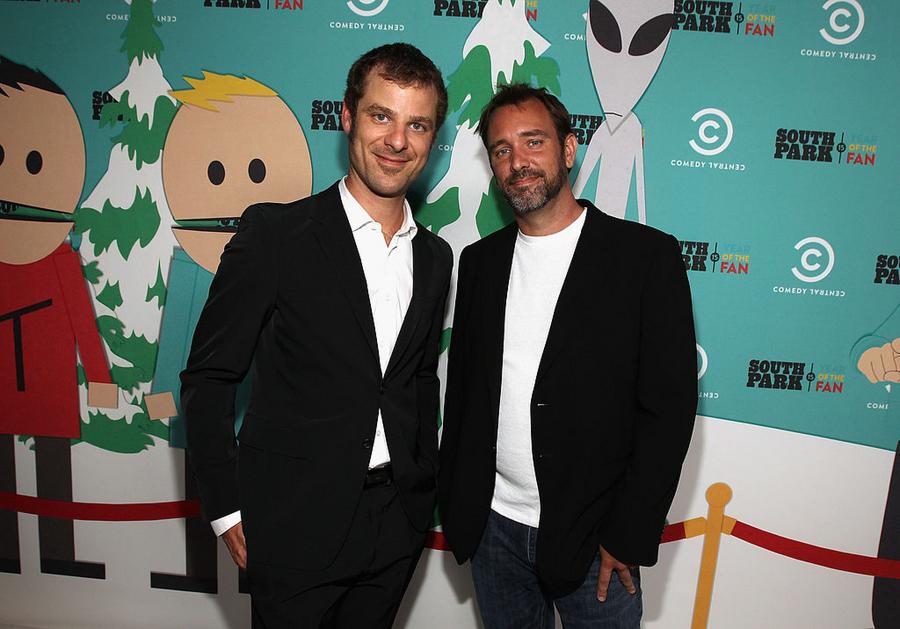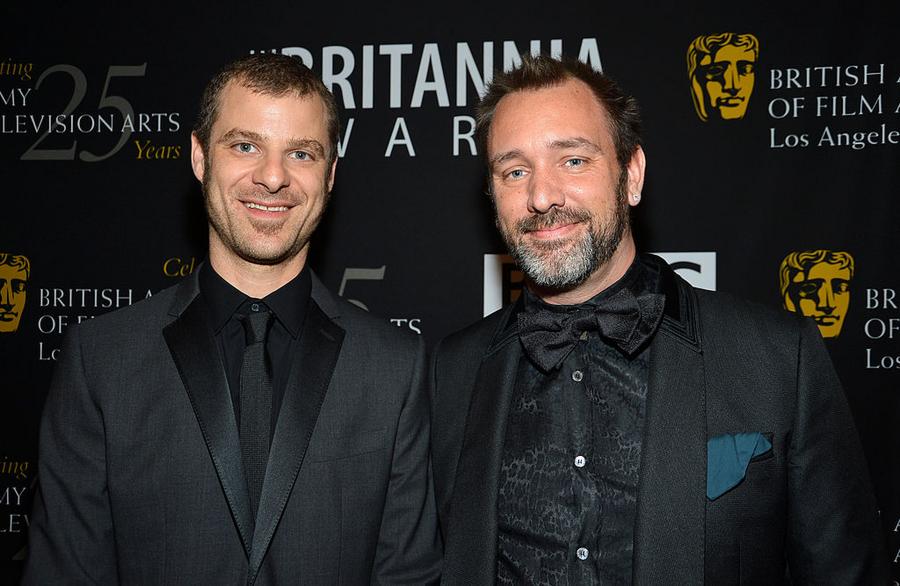In 99.99% of Hollywood creative deals, the artists behind a hit show don't actually control what happens to their creation. Sure, they might own a small slice of backend royalties—but they typically have zero say in how, when, or where the show gets sold.
Take Jerry Seinfeld and Larry David. Despite co-creating "Seinfeld," a cultural juggernaut worth billions, they don't control syndication or streaming rights. They both own 15% of the show's "backend." So when a new licensing deal is signed—whether it's Netflix, Hulu, or a late-night cable block—they just get a check in the mail for their respective 15% shares of the proceeds. That's how it works for 99.99% of creators.
"South Park" creators Matt Stone and Trey Parker do not have the standard setup. In fact, they have what might be the most lucrative contract in Hollywood history. And it's all thanks to a throwaway clause in a contract from 1997 that was totally worthless for about two decades. By any reasonably measure, that "worthless" has almost certainly made the South Park guys BILLIONAIRES – at least on paper. They are almost certainly on their way to being multi-billionaires. But first, they need to wage a brutal, real-world fight over who controls their empire—and whether that once-worthless clause still holds all the power.

Christopher Polk/Getty Images
From College Kids to Comedy Central
Matt Stone and Trey Parker met in a film class at the University of Colorado Boulder in the early 1990s. They bonded instantly over their shared love of absurdist humor, crude animation, and "Monty Python." Their first collaboration was a handmade animated short called "The Spirit of Christmas," a rough, foul-mouthed holiday special featuring early versions of four foul-mouthed kids from Colorado.
That short made its way to Los Angeles thanks to a Fox executive who mailed out VHS tapes as his personal Christmas card. The tape went viral in pre-Internet Hollywood—passed from agent to agent, executive to executive—until the pair found themselves with a deal at a scrappy, little-known cable network called Comedy Central.
In August 1997, "South Park" premiered to instant controversy and massive ratings. Within a year, it was a cultural phenomenon. And almost by accident, Stone and Parker were in business with a media company that had no idea just how valuable their crude cartoon would become—or how much control its creators were about to secure.
A Worthless Contract Clause
When Parker and Stone signed their first long-term contract with Comedy Central in 1997, Matt and Trey's lawyer slipped a line of text into their contract that was absolutely worthless at the time. No one at the network thought much of it. It was the kind of "sure, whatever" legal language that gets tossed into contracts all the time and never matters.
That throwaway line from 1997 gives Matt and Trey a "50% cut of any revenue generated apart from the actual show's television broadcast."
And for ten years, it didn't matter. Then came 2007.
At the time, YouTube was exploding. Viacom was suing Google for $1 billion over copyright infringement. "South Park" clips were being uploaded and shared everywhere. In January of 2007, Netflix launched its beta streaming service of around 1,000 titles, available only through a web browser.
That's how the world looked when Matt and Trey's contract was up for renewal.
During negotiations, their lawyer reminded Comedy Central's legal team about that dusty little clause from 1997. And for the first time, its value became obvious.
The result was a groundbreaking new deal. Parker and Stone launched South Park Studios, their own digital platform. Most importantly, the 2007 renegotiation finally highlighted that Matt and Trey technically owned 50% of every dollar the show made away from TV… AKA online. In all of television history, there may not be another show with a clause this powerful—or creators with this much leverage.
So, when Hulu paid $192 million for streaming rights in 2015, they got half. When HBO Max shelled out $500 million in 2019, they got half. And when ViacomCBS offered them $900 million in 2021 to keep making episodes and exclusive movies? That clause still stood.
And here's the craziest part: Matt and Trey never had to give up ownership of the show to make all that money. Unlike George Lucas, who sold "Star Wars" to Disney for $4 billion and walked away, Parker and Stone have managed to extract nearly $2 billion from "South Park" over the last decade without ever selling it. That 50% clause has allowed them to stay in the driver's seat—creatively, legally, and financially—while Hollywood studios rotated through executives, rebrands, and failed streaming bets.
The 2021 deal with ViacomCBS—which paid them $900 million to deliver new seasons of the show and 14 exclusive movies for Paramount+—was seen as a career-defining victory. It gave Paramount prestige content for its growing streaming service and kept "South Park" rolling through at least 2027. But crucially, it still didn't touch their digital rights. The clause remained fully intact.
And that brings us to the current flashpoint. The original HBO Max streaming deal—signed in 2019 and reportedly worth over $500 million—has expired. A new multi-billion-dollar licensing opportunity is on the table. Parker and Stone want to make a deal. So does Paramount. But a new player is complicating everything—and threatening to unravel the most valuable clause in TV history.

Frazer Harrison/Getty Images
Enter Skydance & A $2.5 Billion Deal
In 2024, Paramount Global agreed to merge with Skydance Media in an $8 billion deal that would shift control of the legendary studio from Shari Redstone to David Ellison, the tech billionaire's son and founder of Skydance. The merger hasn't officially closed yet, but under the terms of the agreement, Skydance was granted the right to review and approve any "material contracts" signed in the interim, including, critically, any new streaming deal for "South Park."
That's when things started getting messy.
As first reported last month by Bloomberg, according to letters sent by Parker and Stone's legal team, Skydance has allegedly begun interfering in ongoing negotiations. At the time, Parker and Stone were in talks with Warner Bros. Discovery (HBO Max) and Netflix about a new global streaming agreement reportedly worth up to $2.5 billion. But behind the scenes, an executive was contacting both parties and pushing for contract changes that would benefit Paramount+, such as shortening the deal length from 10 to 5 years and demanding an exclusive 12-month window for new episodes on Paramount's own service.
Park County, Parker and Stone's company, accused Shell of overstepping, arguing that neither Skydance nor RedBird had any right to issue directives on behalf of South Park Digital Studios, the joint venture that controls streaming rights. In a letter dated June 21, Park County threatened legal action and warned that Shell's interference could "depress the value" of the potential deals.
Global Fallout
As negotiations stalled and tensions escalated behind the scenes, the effects started spilling out into public view. On July 1, international fans of "South Park" woke up to find the show abruptly removed from Paramount+ in dozens of countries—including Canada, Australia, the U.K., France, Germany, and Japan. The five-year international streaming license had lapsed, and without a new deal in place, Paramount was legally required to pull the episodes. The timing couldn't have been worse: Season 27 is set to premiere on July 23.
Fan outrage exploded across Reddit and social media. Subscribers threatened to cancel their Paramount+ accounts. Some shared VPN workarounds; others just posted furious Cartman memes. One Redditor summed up the mood bluntly:
"The only reason I had Paramount+ was to watch 'South Park.' I just canceled."
Inside the industry, the bigger story was unfolding around the negotiating table. On July 14, Hollywood insider Matt Belloni reported that Matt and Trey had hired high-powered litigator Bryan Freedman—the same attorney used by clients like Tucker Carlson, Chris Cuomo, and Gabrielle Union in multimillion-dollar disputes. The message was clear: if Skydance and RedBird keep interfering, the "South Park" guys are ready to sue.
Here we go: Per sources, South Park creators Matt Stone and Trey Parker have hired litigator Bryan Freedman in their dispute with David Ellison and the incoming Paramount regime. Lawsuit looking much more likely.
— Matthew Belloni (@MattBelloni) July 14, 2025
And that brings us back to the contract clause that started it all. In 1997, it was meaningless. In 2007, it became valuable. By 2025, it's the basis of a billion-dollar power struggle. Whether Parker and Stone win the next round in court or the boardroom remains to be seen—but one thing is certain: no one is signing a "worthless" clause like that again.
South Park Billionaires
Back in 2021, when the $900 million streaming deal was announced, we estimated that the South Park guys' net worths were in the $600-700 million range. Today, we are officially anointing them both as billionaires. Let me say that again: Matt Stone's net worth is $1 billion. Trey Parker's net worth is $1 billion.
And that might be conservative! Put it this way – What would South Park be worth overall if Matt and Trey put it up for sale? Let's say they both conservatively make $500 million every few years? So $1 billion total every few years. Wouldn't the value of that be at least 4-5x? As in $4-5 billion? Prove me wrong.
Oh! And keep in mind, South Park isn't their only extremely lucrative creative property. The duo ALSO created the smash-hit "The Book of Mormon" musical. To date, the production has earned over $1 billion in gross ticket sales.
Between their cut of South Park's streaming empire, their Broadway gold mine, and total creative control, Parker and Stone may be the most successful—and most powerful—independent creators in the history of television. And they've done it by pissing everyone off… but also making audiences laugh… for 30 years.
/2021/08/south-park.jpg)
/2021/04/matt-stone.png)
/2025/07/parker-stone-1.jpg)
/2019/09/GettyImages-77610438.jpg)
/2025/07/david-ellison.jpg)
/2019/09/GettyImages-823254230.jpg)
:strip_exif()/2015/09/GettyImages-476575299.jpg)
/2020/02/Angelina-Jolie.png)
/2018/03/GettyImages-821622848.jpg)
/2009/09/Cristiano-Ronaldo.jpg)
/2009/09/Jennifer-Aniston.jpg)
/2020/04/Megan-Fox.jpg)
/2020/06/taylor.png)
/2009/11/George-Clooney.jpg)
/2009/09/Brad-Pitt.jpg)
/2020/01/lopez3.jpg)
/2019/04/rr.jpg)
/2019/10/denzel-washington-1.jpg)
/2017/02/GettyImages-528215436.jpg)
/2019/11/GettyImages-1094653148.jpg)
:strip_exif()/2009/09/P-Diddy.jpg)